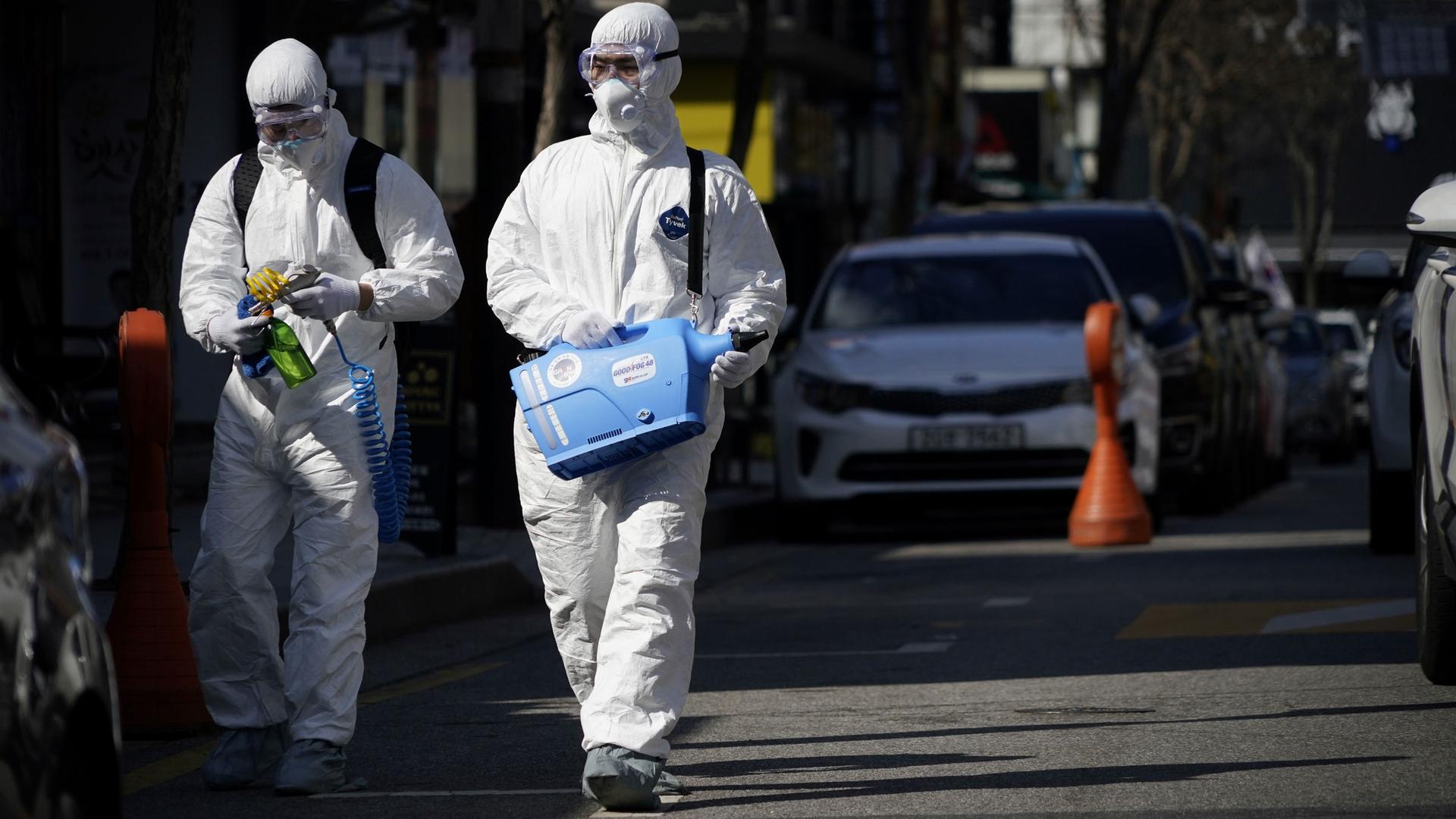Employees from a disinfection service company sanitize a shopping district in Seoul, South Korea, on Feb. 27, 2020.
One can imagine how stressful it must be working in a ward with coronavirus patients. In China, medical professionals have been combating the disease since December.
And many care providers are tired — physically and emotionally.
Related: Americans on alert for coronavirus after CDC warning
Some of those health workers are reaching out to telephone hotlines for support. And the counselors who answer aren’t always in China.
Erjing Cui is a Seattle-based psychotherapist. She volunteers for a crisis hotline called Yong Xin Kang Yi, which translates to “Use Heart to Fight the Virus.” From her base in Washington, she’s taking calls from medical workers in China who need emotional support. She spoke with The World’s host, Marco Werman, about the outbreak and health workers’ needs.
Marco Werman: What kind of calls are you getting and what sorts of problems are health care workers describing to you?
Erjing Cui: Some of the calls that we’re getting [are] of health workers being very stressed out, very exhausted. Some of the calls that we get, some people were suicidal when they were on the phone because they’re so stressed out. They are worried about their families because when they work in the hospitals, they have to stay away from families, for safety reasons.
Related: Iranians skeptical their government can handle coronavirus outbreak
And how busy is the hotline?
Asking for mental health is more of a newer idea, especially using a hotline to call. There still needs to be a lot of awareness created. Medical staff right now, they’re so busy. They’re fighting just days and nights. So we might anticipate that some of the psychological stress or feelings might come up — either later after the crisis is gone, versus right now, when we’re in the midst of them.
So if you get a call from somebody in China who is completely overwhelmed — the doctor, say, who’s been working several 24-hour shifts — how do you respond to them?
Yeah, that’s a really good question. So you want to provide a space, emotional space … They’re probably not looking for any type of advice, at least not right away, when they pick you and they’re really overwhelmed. So our number one thing is to provide the space and see how we can support them. If we feel like they are also overwhelmed to a point where, you know, we’re not sure if they’re safe, we’ll also do some assessments to see if further steps need to be taken.
Related: The coronavirus continues to spread globally
So basically the number one thing is not to really give advice necessarily, but to make people feel comfortable that they can talk. Is that helping?
Yes. For example, there is a nurse calling to say they can’t sleep at night because they’re so anxious, right? And typically, you would think they would just go to sleep and recover, but if they can’t sleep due to anxiety … that’s not good. But after they talk with us, they feel a little better and went to bed, so that’s something that we could do.
Well, that definitely scans with this hashtag #howtodealwithfeelingveryanxiousathome. It’s been trending on the social media platform, Weibo. So, there’s anxiety, as you say. But after several weeks in self-imposed quarantine in an apartment, what does boredom do to one’s psyche?
There was a lot of discussion of like what you can do at home if you’re at home, what are some of the things that you could do to feel more productive instead of, you know, thinking about the coronavirus and worrying about it all the time.
Related: World scrambles to curb fast-spreading coronavirus
We’ve also heard that people — in addition to calling crisis hotlines — are turning to friends and relatives for support. Do you think this human connection is maybe a silver lining to this dark coronavirus cloud?
Of course, I think human connection is everything. Professional support can only do so much, right? And that’s when the human connection that we have around us are the people that surround us every day and really know us. And if you’re lucky that you have loved ones that can support you of course, that would be my number one choice.
This interview has been edited and condensed for clarity.
Our coverage reaches millions each week, but only a small fraction of listeners contribute to sustain our program. We still need 224 more people to donate $100 or $10/monthly to unlock our $67,000 match. Will you help us get there today?
